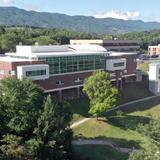- Virginia Highlands Community College promotes lifelong learning by providing quality, affordable higher education including workforce training programs that enable community members to succeed in today's world.
School Highlights
Virginia Highlands Community College serves 2,669 students (30% of students are full-time).
The college's student-teacher ratio of 18:1 is lower than the state community college average of 23:1.
Minority enrollment is 11% of the student body (majority Black and Hispanic), which is less than the state average of 53%.
Quick Facts (2026)
- Enrollment: 2,669 students
- In-state tuition: $4,170
- Out-state tuition: $10,008
- Acceptance Rate: 80%
- Student-teacher ratio: 18:1
- Minority enrollment: 11%
- Source: Integrated Postsecondary Education Data System (IPEDS)
School Overview
The teacher population of 151 teachers has stayed relatively flat over five years.
Virginia Highlands Community College
(VA) Community College Avg.
Carnegie Classification
Associate's Colleges: Mixed Transfer/Career & Technical-Mixed Traditional/Nontraditional
Associate's Colleges: Mixed Transfer/Career & Technical-Mixed Traditional/Nontraditional
Institution Level
At least 2 but less than 4 years
At least 2 but less than 4 years
Institution Control
Public
Public
Total Faculty
151 staff
129 staff
School Calendar
Student Body
The student population of Virginia Highlands Community College has grown by 27% over five years.
The student-teacher ratio of 18:1 has decreased from 32:1 over five years.
The Virginia Highlands Community College diversity score of 0.21 is less than the state average of 0.71. The school's diversity has grown by 56% over five years.
Total Enrollment
2,669 students
1,608 students
Student-Teacher Ratio
18:1
23:1
# Full-Time Students
812 students
637 students
# Part-Time Students
1,857 students
971 students
# Enrollment Undergraduate
266 students
314 students
# Full-Time Undergraduate Students
812 students
611 students
# Full-Time Graduate Students
n/a
158 students
# Part-Time Undergraduate Students
1,857 students
971 students
# Part-Time Graduate Students
n/a
61 students
Total Dormitory Capacity
n/a
476 students
% American Indian/Alaskan
n/a
n/a
% Asian
1%
8%
% Hispanic
3%
13%
% Black
3%
21%
% White
89%
47%
% Hawaiian
n/a
n/a
% Two or more races
2%
5%
% Non Resident races
n/a
2%
% Unknown races
1%
4%
Diversity Score
0.21
0.71
College Completion Rate (Students who graduate in less than 4 years)
44%
41%
College Completion Rate (Students who graduate in 4 years or more than 4 years)
n/a
26%
Average Graduate Earnings (10 Years)
$26,700
$29,600
Tuition and Acceptance Rate
The public in-state tuition of $4,170 is more than the state average of $3,748. The in-state tuition has declined by 11% over four years.
The public out-state tuition of $10,008 is more than the state average of $8,977. The out-state tuition has declined by 6% over four years.
In-State Tuition Fees
$4,170
$3,748
Out-State Tuition Fees
$10,008
$8,977
% Students Receiving Some Financial Aid
77%
77%
Median Debt for Graduates
n/a
$10,500
Median Debt for Dropouts
n/a
$5,500
Acceptance Rate
80%
59%
Source: 2024 (or latest year available) Integrated Postsecondary Education Data System (IPEDS) , School Administrators
School Notes
- Virginia Highlands Community College was established on November 30, 1967 by action of the State Board for Community Colleges, and assigned a service region of Washington County, the western portion of Smyth County, and the city of Bristol, Virginia. Today it is one of 23 community colleges within the Virginia Community College System. During its first academic year, 1969-1970, VHCC began delivering the occupational-technical programs that formerly were offered by the Washington County Technical School. More than 300 students enrolled in the first Virginia Highlands classes, which were offered at night in the technical school's facilities. The College moved to its permanent 100-acre campus during the summer of 1970 and, in response to the community's needs, expanded its course offerings to include both occupational-technical programs and baccalaureate-transfer programs. The college buildings are located on a 100 acre campus occupied for the first time in the 1970 summer session. These modern buildings include laboratories, shops, classrooms, offices and a library. In the fall of 1986 the college opened a new 40,000 square feet Learning Resources Center/Business Technologies Building which added dramatically to the educational services available to the region. In the summer of 1994, students, faculty, staff, and administration began using a new 22,000 square feet OccupationalTechnical Center building. There are labs for the air conditioning, heating, general engineering technologies and police science curricula plus a number of offices for faculty and administrators. Virginia Highlands Community College is accredited by the Commission on Colleges of the Southern Association of Colleges and Schools to award the Associate Degree.
Frequently Asked Questions
How much does Virginia Highlands Community College cost?
Virginia Highlands Community College's tuition is approximately $4,170 for In-State students and $10,008 for Out-State students.
What is the acceptance rate of Virginia Highlands Community College?
The acceptance rate of Virginia Highlands Community College is 80%, which is higher than the state average of 59%.
Recent Articles

Community College vs. Bootcamps for Tech Careers in 2026
Community college vs. bootcamps in 2026. Compare cost, outcomes, credentials, and hiring trends to choose the best tech career path.

How to Build a Class Schedule That Fits Your Life (Spring 2026)
Learn how to build a class schedule that fits your life with expert tips, updated strategies for Spring 2026, and practical planning tools for students and families.

Top 10 Jobs for Community College Graduates in 2026
Meta Description: Discover high-demand jobs for community college graduates, with current salary trends, costs, and career pathways.










